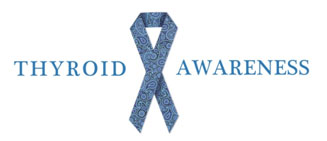January is Thyroid Awareness month and with an estimated 15 million Americans having undiagnosed thyroid problems it clearly is something that should be given attention.
The thyroid gland is a small, butterfly-shaped gland located in the base of the neck. Although relatively small, the thyroid gland influences the function of many of the body’s most important organs, including the heart, brain, liver, kidneys and skin.
Thyroid Awareness Month was created to bring more attention to thyroid disease, which is more common than diabetes or heart disease. Thyroid disease is a fact of life for as many as 30 million Americans, with women five times more likely than men to suffer from hypothyroidism.
Untreated thyroid disease may lead to elevated cholesterol levels and subsequent heart disease, as well as infertility and osteoporosis. Research also shows that there is a strong genetic link between thyroid disease and other autoimmune diseases, including types of diabetes, arthritis and anemia.
To help with early detection and, in some cases, help you find lumps or enlargements in the neck that may point to a thyroid condition, you can perform a simple Thyroid Neck Check Self-Exam courtesy of thyroidawareness.com
Here’s some tips to help keep your thyroid healthy:
– One of the most helpful things you can do to help your thyroid health and metabolism is to drink enough water. Water helps your metabolism function more efficiently, and can help reduce your appetite, get rid of water retention and bloating, improve your digestion and elimination, and combat constipation.
– Your thyroid contains the only cells in your body that absorb iodine. Without sufficient iodine, your thyroid cannot produce adequate hormones to help your body function on an optimal level. Because iodized salt is heavily processed, some recommend avoiding iodized salt and instead getting iodine naturally from sea vegetables (seaweed), such as hijiki, wakame, arame, dulse, nori, and kombu. It should be noted, however, that too much iodine can actually trigger thyroid problems and worsen symptoms, so it’s important to have a healthy balance.
– Selenium is a critical mineral for the proper functioning of your thyroid gland, and is used to produce and regulate the T3 hormone. Selenium can be found in foods such as shrimp, snapper, tuna, cod, halibut, calf’s liver, button and shitake mushrooms and Brazil nuts.
– Zinc, Iron and Copper are needed metals in trace amounts for your healthy thyroid function. Low levels of zinc have been linked to low levels of TSH, whereas iron deficiency has been linked to decreased thyroid efficiency. Copper is also necessary for the production of thyroid hormones. Foods such as calf’s liver, spinach, mushrooms, turnip greens and Swiss chard can help provide these trace metals in your diet.
– Omega-3 Fats are essential fats, found in fish or fish oil, which play an important role in thyroid function, and many help your cells become sensitive to thyroid hormone.
– The antioxidant vitamins A, C and E can help your body neutralize oxidative stress that may damage the thyroid. In addition, B vitamins help to manufacture thyroid hormone and play an important role in healthy thyroid function.



I have HypoThyroid. I would like to get some of those Thyroid Pins. Do you have some extras?
We don’t have any pins, you might want to get in touch with the folks at thyroidawareness.com and see if they can direct you to where you can find them.